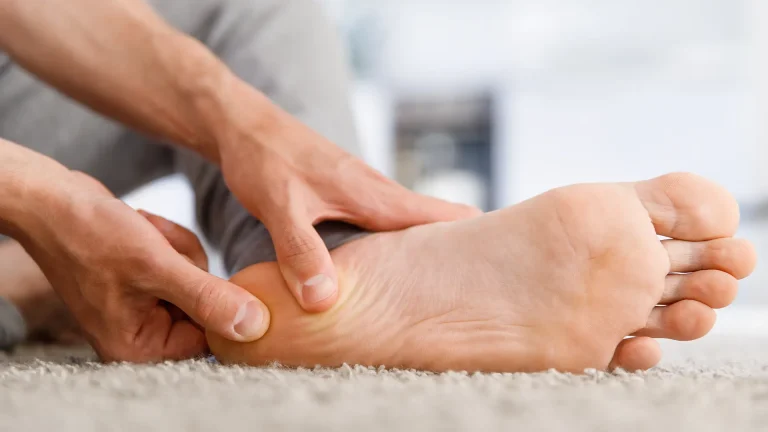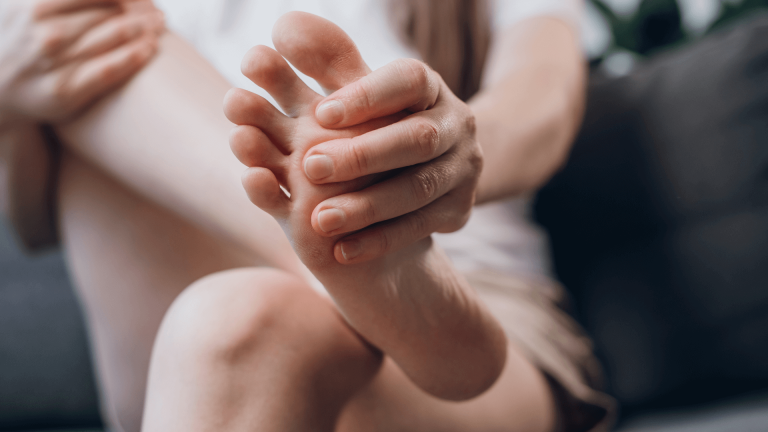Foot surgery is a critical intervention for various diseases that include fractures and bunions, which can be as simple as neuromas or reconstructive operations. However, there is a common problem such as nerve pain after the operation. It should be known how to deal with this condition after foot surgery because it will contribute greatly towards faster healing and quality of life. This article explains ways of managing and relieving neuropathic pain experienced by patients following an operation in the legs.
Nerve Pain Post-Surgery
Damage to nerves causes neuropathic pain or nerve pain. During foot surgery, this could result from direct injury of the nerves during the procedure, inflammation, or the formation of scar tissue that compresses or irritates them. It may be experienced like stabbing, burning, prickling, or shooting pain and it usually affects mobility as well as day-to-day activities.
How to Treat Nerve Pain After Foot Surgery
Medications
To manage nerve pain, it is usually necessary to take some form of medication. They include the following:
- NSAIDs: These are medications that decrease swelling and relieve pain. Common NSAIDs are such drugs as ibuprofen or naproxen.
- Antidepressants: Amitriptyline, duloxetine, and certain other antidepressants can help change how the brain and spinal cord interpret signals of pain. This is useful when treating nerve pain.
- Anticonvulsants: Gabapentin or pregabalin for example are types of drugs that were created specifically for neuropathic type of pain relief by modulating it in nerves.
- Topical Treatments: In some cases, numbing creams/patches with lidocaine or capsaicin can be used to alleviate localized discomfort while reducing the transmission of painful impulses through neuropeptides.
Physical Therapy
Physical therapy is essential in the management of nerve pain and recovery. A personalized workout plan will improve blood circulation, reduce rigidity, and promote overall foot functioning. The following may be used in physical therapy:
- Strength Training Exercises: They aim to reestablish muscle power and support the foot.
- Flexibility exercises: They help to keep mobile and avoid scar tissue from restricting movement.
- Manual Therapy: Hands-on techniques that move soft tissues and joints relieve pain and improve function.
- Electrical Stimulation: TENS (Transcutaneous Electric Nerve Stimulation) can regulate pain signals thus alleviating it.
Lifestyle Modifications
Adopting certain lifestyle adjustments can significantly impact the control of nerve aches. These include:
- Weight Management: Maintaining a wholesome weight can lessen the pressure on the feet and decrease aches.
- Footwear: Wearing supportive and cushy footwear can alleviate pressure at the affected place and improve universal foot health.
- Activity Modification: Limiting activities that exacerbate aches and incorporating low-impact sports like swimming or cycling can be beneficial.
Complementary Therapies
Several complementary remedies have proven promise in treating nerve pain after foot surgical procedures. These include:
- Acupuncture: This conventional Chinese remedy method involves placing high-quality needles into particular points on the body to alleviate aches and sell healing.
- Massage Therapy: Regular massages can enhance blood float, lessen muscle anxiety, and alleviate aches. Mind-Body Techniques: Practices like yoga, meditation, and mindfulness can help manage aches by reducing strain and enhancing ordinary well-being.
Surgical Interventions
In cases where conservative remedies fail to provide comfort, surgical options are probably considered. These can embody:
- Nerve Decompression: This approach entails relieving strain at the affected nerve by eliminating surrounding tissues or bones.
- Neurolysis: This technique consists of the surgical removal of scar tissue that is compressing or traumatic the nerve.
- Nerve Grafting: In times of massive nerve damage, nerve grafting might be finished to restore the damaged nerves.
Innovative Treatments
Advancements in clinical generation have introduced revolutionary treatments for nerve pain, such as:
- Platelet-wealthy plasma (PRP) Therapy: This involves injecting focused platelets from the patient’s blood into the affected vicinity to promote restoration and decrease infection.
- Stem Cell Therapy: This cutting-edge remedy makes use of stem cells to regenerate broken tissues and nerves, probably imparting vast pain alleviation.
- Laser Therapy: Low-stage laser remedy can lessen irritation and pain by using stimulating mobile restore procedures.
Comprehensive Approach to Recovery
A comprehensive approach to recovery is essential when learning how to treat nerve pain after foot surgery. Combining multiple treatment modalities often yields the best results. Here’s a suggested plan:
Initial Phase (0-2 Weeks Post-Surgery)
- Focus on rest and protection on the surgical website online.
- Use prescribed medicines to manage acute pain.
- Begin mild range-of-movement physical activities as counseled by a healthcare professional.
Sub-Acute Phase (2-6 Weeks Post-Surgery)
- Continue with medicines if essential.
- Introduce physical therapy exercises to improve mobility and strength.
- Start using topical remedies for localized pain relief.
Rehabilitation Phase (6-12 Weeks Post-Surgery)
- Gradually increase the intensity of physical remedy exercises.
- Consider complementary treatment plans including acupuncture or rubdown.
- Implement way-of-life changes to assist usual recovery.
Long-Term Management (3+ Months Post-Surgery)
- Maintain regular bodily therapy periods as wanted.
- Continue with any useful complementary treatment options.
- Monitor and alter medicinal drugs below medical supervision.
- Consider superior treatments like PRP or stem cellular therapy if pain persists.
When to Seek Medical Advice
Understanding the way to deal with nerve pain after foot surgical treatment consists of knowing whilst seeking clinical recommendations. Persistent or worsening aches, symptoms of infection (along with accelerated redness, swelling, or fever), or any new symptoms must prompt a go-to to the healthcare provider. Early intervention can save you headaches and improve effects.
Most Common FAQs
How long does nerve pain last after foot surgery?
Nerve pain duration varies depending on the type of surgery and individual healing. Mild pain may improve within a few weeks, while severe cases can persist for months.
What medications are effective for nerve pain after foot surgery?
Common options include NSAIDs (ibuprofen, naproxen), certain antidepressants (amitriptyline, duloxetine), anticonvulsants (gabapentin, pregabalin), and topical treatments like lidocaine or capsaicin.
Can physical therapy help relieve nerve pain after foot surgery?
Yes. Targeted exercises, flexibility routines, manual therapy, and TENS (electrical stimulation) can reduce pain, improve mobility, and support faster recovery.
When should I consider advanced treatments like PRP or stem cell therapy?
If conservative methods (medications, therapy, lifestyle changes) fail to reduce pain, advanced options like PRP injections, stem cell therapy, or laser therapy may be recommended under medical supervision.
What lifestyle changes can help manage nerve pain after foot surgery?
Maintaining a healthy weight, wearing supportive footwear, modifying activities to avoid strain, and practicing stress-reducing techniques like yoga or meditation can all help reduce nerve pain.
Conclusion
Managing nerve pain after foot surgical treatment requires a multifaceted approach. By knowing the numerous treatments to be had—from medicinal drugs and bodily therapy to complementary and superior cures—sufferers can successfully deal with their pain and beautify their recovery. Tailoring a treatment plan to character needs and operating intently with healthcare professionals is critical in navigating the submit-surgical journey. Remember, studying a way to treat nerve aches after a foot surgical procedure not only includes addressing the pain but also selling average foot health and properly-being.





